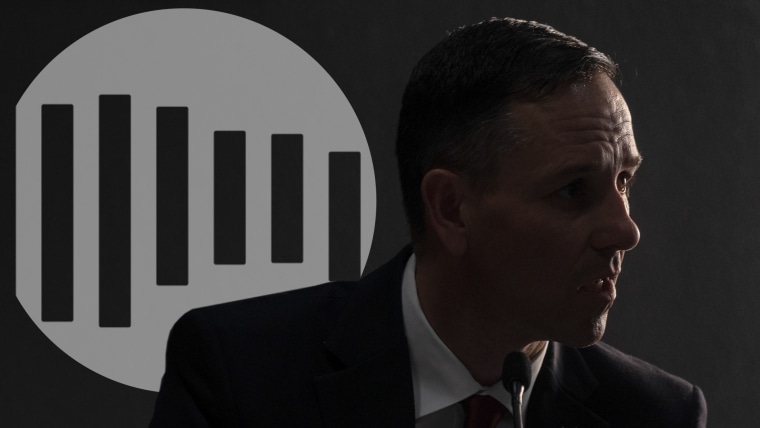This article was published in partnership with ProPublica, a nonprofit newsroom that investigates abuses of power, and The Texas Tribune, a nonprofit, nonpartisan local newsroom that informs and engages with Texans. Sign up to receive ProPublica’s biggest stories as soon as they’re published, and sign up for The Brief Weekly to get up to speed on essential coverage of Texas issues.
In early January, a day before students returned from winter break, Jeremy Glenn, the superintendent of the Granbury Independent School District in North Texas, told a group of librarians he’d summoned to a district meeting room that he needed to speak from his heart.
“I want to talk about our community,” Glenn said, according to a recording of the Jan. 10 meeting obtained and verified by NBC News, ProPublica and The Texas Tribune. Glenn explained that Granbury, the largest city in a county where 81 percent of residents voted for then-President Donald Trump in the 2020 presidential election, is “very, very conservative.”
He noted that members of Granbury’s school board — his bosses — were also very conservative. And to any school employees who might have different political beliefs, Glenn said, “You better hide it,” adding, “Here in this community, we’re going to be conservative.”
That’s why, he said, he needed to talk to them about some of the books available in the school district’s libraries.
For months, conservative parents and politicians across Texas had been pressuring districts to remove from school libraries any books that contain explicit descriptions of sex, labeling several young adult novels as “pornography.” Gov. Greg Abbott, a Republican, called for criminal investigations into school employees who make such content available to students.
Many of the titles targeted statewide have featured queer characters and storylines, but those calling for the books’ removal have repeatedly said they are concerned only with sex and vulgarity, not with suppressing the views of LGBTQ students and authors.
Glenn made a similar argument during his closed-door meeting with librarians in Granbury, which is about an hour’s drive southwest of Dallas.
“I don’t want a kid picking up a book, whether it’s about homosexuality or heterosexuality, and reading about how to hook up sexually in our libraries,” Glenn said.
He also made it clear that his concerns specifically included books with LGBTQ themes, even if they do not describe sex. Those comments, according to legal experts, raise concerns about possible violations of the First Amendment and federal civil rights laws that protect students from discrimination based on their gender and sexuality.
“And I’m going to take it a step further with you,” he said, according to the recording. “There are two genders. There’s male, and there’s female. And I acknowledge that there are men that think they’re women. And there are women that think they’re men. And again, I don’t have any issues with what people want to believe, but there’s no place for it in our libraries.”
Minutes later, after someone asked whether titles on racism were acceptable, Glenn said books on different cultures “are great.”
“Specifically, what we’re getting at, let’s call it what it is, and I’m cutting to the chase on a lot of this,” Glenn said. “It’s the transgender, LGBTQ and the sex — sexuality — in books. That’s what the governor has said that he will prosecute people for, and that’s what we’re pulling out.”
Over the next two weeks, the school district embarked on one of the largest book removals in the country, pulling about 130 titles from library shelves for review. Nearly three-quarters of the removed books featured LGBTQ characters or themes, according to a ProPublica and Texas Tribune analysis. Others dealt with racism, sex ed, abortion and women’s rights.
Two months later, a volunteer review committee voted to permanently ban three of the books and return the others to shelves. But that may not be the end of the process.
In his recorded comments to librarians, Glenn described the review of 130 titles as the first step in a broader appraisal of library content, and a new policy approved by the school board later in January grants him and other administrators broad authority to unilaterally remove additional titles they deem inappropriate, with no formal review and no way for the public to easily find out what has been pulled from shelves.
Legal, education and First Amendment experts contacted by NBC News, ProPublica and the Tribune said the audio of the superintendent, combined with the decision to abruptly remove books from circulation, even temporarily, raises constitutional concerns.
Glenn’s comments also call into question the district’s commitment to fostering a safe and inclusive school environment for LGBTQ students and could be grounds for a complaint to the Department of Education’s Office for Civil Rights, which enforces federal anti-discrimination laws, the experts said.
“This audio is very much evidence of anti-LGBTQ and particularly anti-trans discrimination,” said Kate Huddleston, a staff attorney with the American Civil Liberties Union of Texas, who reviewed the recording at the request of NBC News, ProPublica and the Tribune. “It is very much saying the quiet part out loud in a way that provides very significant evidence that book removals in the district are occurring because of anti-LGBTQ bias.”
In a written statement, Glenn said the district was committed to supporting students of all backgrounds. And although he said the district’s primary focus is educating students, “the values of our community will always be reflected in our schools.”
“In Granbury and across Texas we are seeing parents push back and demand elected officials put safeguards in place to protect their children from materials that serve no academic purpose, but rather push a political narrative,” Glenn said in the statement. “As a result, classrooms and libraries have turned schools into battle grounds for partisan politics.”
None of Granbury’s school board trustees responded to messages requesting comment. District spokesperson Jeff Meador sent a statement emphasizing that all of the books permanently removed from shelves in Granbury are “sexually explicit and not age-appropriate” and noting that district libraries “continue to house a socially and culturally diverse collection of books for students to read, including books which analyze and explore LGBTQ+ issues.”
The three books the committee voted to remove were “This Book Is Gay,” a coming out guide for LGBTQ teens by transgender author Juno Dawson that includes detailed descriptions of sex; “Out of Darkness,” by Ashley Hope Pérez, a young adult novel about a romance between a Mexican American girl and a Black boy that includes a rape scene and other mature content; and “We Are the Ants,” by Shaun David Hutchinson, a coming-of-age novel about a gay teenager that includes explicit sexual language.
At least one member of the volunteer review committee was dissatisfied that only three books have been permanently removed so far, and she has started calling for a second review of the ones that have been returned.
“There are people who want to tear down values and force theirs and then also force acceptance,” Monica Brown, the committee member, said in a Facebook video following the decision. Brown did not respond to a request for comment.
One of the Granbury ISD employees in attendance at the Jan. 10 meeting with librarians said that regardless of which books are pulled from shelves or returned, Glenn’s comments left her afraid to display or purchase LGBTQ books going forward — a chilling effect that she said could limit the diversity of Granbury library catalogs for years to come. The staff member, who was not the source of the audio, spoke on the condition that she not be named, because she feared retaliation from the district.
“He literally said books on trans issues have no place in a school,” she said. “It was alarming.”
The superintendent’s comments reflect a broader national debate. Conservative state legislatures across the country have been considering bills to restrict the ways educators teach about gender and sexuality in schools. This month, the Florida Legislature passed the Parental Rights in Education bill, dubbed the “Don’t Say Gay” bill by its critics, which restricts or bans discussion of LGBTQ issues in the classroom.
Conservative activists and politicians pushing these changes nationally say the goal is to prevent teachers from having sensitive conversations with students unless the parents give their consent. Some have at times conflated sex and sexual orientation, accusing educators of attempting to “groom” young children because the teachers had discussed the existence of transgender people and same-sex relationships. Opponents contend that the measures discriminate against LGBTQ students and educators and violate federal laws meant to prevent discrimination in schools.
These changes coincide with attempts in several conservative states to limit the rights of transgender minors to participate in school sports and to access gender-affirming medical care. Last month, Abbott issued a directive — temporarily halted by a Texas judge — ordering the state’s child welfare agency to open abuse investigations into any reported instances of minors receiving such medical care, including the prescription of puberty blockers or hormones.
As superintendent of a district that’s home to more than 7,400 students, Glenn is responsible for implementing and enforcing policies that ensure that children are not discriminated against based on their gender identity or sexual orientation.
After listening to the recording of Glenn’s remarks, Lou Whiting, a nonbinary junior at Granbury High School, said they were outraged. Whiting and another student who’s part of the LGBTQ community said classmates at Granbury have harassed them at school, but they’ve avoided reporting the harassment because they worried administrators wouldn’t take their complaints seriously.

Glenn’s comments validated those fears, Whiting said.
“I don’t feel incredibly safe or welcomed by a large majority of the students at my school,” Whiting said. “I’ve been called slurs. I’ve been verbally attacked. I’ve been physically attacked. But it kind of feels worse when the attacks are coming from adults, from the people who are supposed to keep us safe.”
‘A very conservative board’
The meeting with librarians wasn’t the first time Glenn had publicly embraced socially conservative values in schools.
In 2014, when he was superintendent at another district, he and a pair of education professors wrote a book called “Daily Devotionals for Superintendents,” which lamented the legalization of same-sex marriage and the passage of state laws “making it a crime to counsel gay young people about changing their sexual orientation.”
In another section of the book, Glenn and his co-authors said those pushing for broader acceptance of “alternative lifestyles” and other cultural changes are doing so through the indoctrination of children in schools, as “was done by Hitler when he took over Germany.” They warned that school superintendents will face pressure to “recognize the demands of alternative life-style adults,” adding, “As a superintendent, you will have to be strong and courageous to stand against the onslaught of the enemy. Your country and your children’s future are at stake.”
Glenn, who arrived at Granbury ISD in 2018 following stints leading two other Texas districts, said he couldn’t recall if he wrote those specific passages, but he acknowledged co-authoring the book, adding, “It’s fair to say I am aware of its content.”
In November, voters in Granbury elected a pair of school board members who, while campaigning, also raised concerns about the spread of LGBTQ-affirming curricula in schools. Melanie Graft rose to local prominence after leading a conservative movement in 2015 to remove a pair of LGBTQ-themed picture books from the children’s section at Granbury’s public library. She ran alongside Courtney Gore, the co-host of a local far-right internet talk show.
As candidates, the women promised to stop the “indoctrination” of students and rid the district of educational materials they said promote LGBTQ ideology or what they referred to as critical race theory, a university-level academic framework based on the idea that racism is embedded in U.S. legal and other structures.
In the weeks after Graft’s and Gore’s election victories, Glenn began asking district administrators about several books, including “This Book Is Gay,” that an unnamed school board member had found on the district’s online card catalog, according to text messages obtained by a parent through an open records request and shared with the news organizations.
The text messages included screenshots of eight titles, all of which deal with LGBTQ topics, with the keyword search terms “gay,” “trans” and “gender” highlighted in some of the book descriptions.
In a December text message, Glenn asked an administrator in charge of overseeing district libraries if any of the books were physically on shelves and available to students. Librarians needed to have a sense of urgency in responding to community complaints about books, Glenn wrote, “otherwise this will consume us in the spring.”
The list comprised titles that were aimed at helping transgender and LGBTQ teens navigate life and that told teen love stories through an LGBTQ lens, as well as an LGBTQ-themed fairy tale. Although some of the books included descriptions of sex, others did not.
Glenn referred to concerns from a board member during his Jan. 10 meeting with librarians.
“We do have a very conservative board,” Glenn said, according to the recording. “They are elected, and recently more conservative. And so that’s what our community is. That’s what our job is.”
Source: | This article originally belongs to Nbcnews.com










